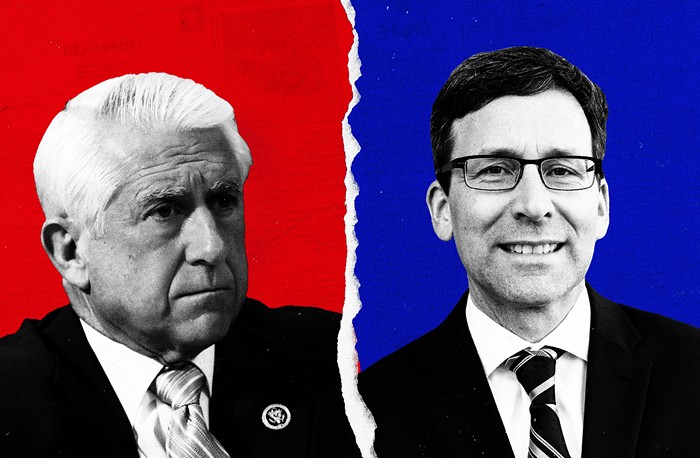Washington State House candidate and We Heart Seattle Executive Director Andrea Suarez is running in one of bluest, queerest districts in the state, yet she could not or would not answer the Stranger Election Control Board’s (SECB) basic questions about police union bargaining and transgender health care for minors.
In an endorsement meeting last month, The Stranger asked 43rd Legislative District candidates if they “would support a bill that makes it against state law for officers to bargain over accountability issues” and if “transgender children had the right to make medical decisions with consultation from their doctors.”
Statewide Poverty Action Network lobbyist Shaun Scott answered yes to both questions. With some prodding, so did Qualtrics technical account manager Daniel Carusello. (Scott and Carusello were later endorsed by the SECB and the Seattle Times Editorial Board, respectively. Suarez has received few endorsements, but she has put down a lot of yard signs in the 43rd and has raised a lot of money.)
The Stranger tried to reach Suarez for an interview multiple times, but she dodged and asked for one to two weeks to prepare her answers and added that a “trans friend” on her campaign was “educating” her. As of press time, she still hasn't given an answer to either question.
Taking Accountability Measures Off the Bargaining Table
In our meeting last month, The Stranger asked all candidates, “Would you support a bill that makes it against state law for officers to bargain over accountability issues?”
Carusello, who answered first, said he would.
Suarez couldn’t answer, seemed baffled by the premise of the question, and then asked if we were talking about whether police should have unions at all.
When the SECB restated the question and she still seemed confused, we explained that when officers are bargaining for their contract, they’re allowed to squabble with the City over accountability measures.
“I don’t think I’m really clear, so I’m just not going to answer the question,” Suarez said.
Not every candidate is an expert on every issue, but police bargaining is not an arcane topic, especially for a candidate running to represent voters in a district that was a seat of protest against racist policing after Minneapolis cop Derek Chauvin murdered George Floyd in 2020.
According to police reform advocates, including the ACLU of Washington, police collective bargaining agreements have historically been a major obstacle to the police accountability measures desperately needed in places like Seattle. Under the City’s latest contract with the Seattle Police Officers Guild, which was signed in May, officers received a 24% raise with few accountability strings attached.
In the meeting, Scott said he would support the legislation and took the opportunity to snipe at Suarez. He said it was “unconscionable” that somebody could live in Seattle for the last four years and not have an understanding of, or opinion on, the issue.
“We’ve lived through the largest civil rights uprising in American history that took place here,” Scott said. “Our district was the epicenter of it. You would be a tremendous disappointment to our constituents were you to voice the opinion that you just voiced and not know about the issues. There were so many who were in the 43rd that were on the streets, that were protesting, that understand that this is a life or death question.”
As he spoke, Suarez hummed agreeably before defending herself.
“I’m just trying to catch up,” Suarez said. “I am a political outsider. I am very strong on some certain issues. The reason why I’m not taking a position is because we are down in our agency and I think we need to recruit police, whether they’re a civilized, a non-badge, non-gun version.”
As for the police union, it has hampered that non-badge, non-gun option.
Trans Rights
During the meeting, The Stranger also asked, “Do transgender children have the right to make medical decisions with consultation from their doctors?”
Scott answered that he did support transgender children making these medical decisions with their doctors. After a clarifying question about age, Carusello said he also supported those decisions.
Saurez said she did not have enough “information” to answer the question, but that she had heard “controversies” about gender-affirming care for minors, and that clinics around the world were “actually being shut down” over the practice.
Again, she didn’t seem to understand what we were asking.
In a later text, Suarez implied our question was about giving trans youth at any age access to gender-affirming care without parental involvement, but that is not what The Stranger asked. (In Washington, gender-affirming care generally requires the consent of a parent or guardian, and certain procedures are only available to adults; before puberty, international standards dictate that treatment is limited to social support and changes like names, pronouns, and clothes.)
It is straightforwardly true that clinics are closing or reducing their medical services for transgender children, but the reason they’re doing that is crucial.
Providers are not responding to a significant change in scientific evidence, which overwhelmingly supports transgender health care for children and adults as necessary and beneficial to the well-being of their patients. They’re not deviating from the medical establishment, either, where there is widespread consensus in favor of gender-affirming care for minors from more than 60 major medical groups.
They’re responding to a hostile political climate that has produced 1,200 anti-trans bills from Republican-controlled state legislatures in two years, as well as rulings from politically appointed regulatory bodies in states like Florida. As it stands, almost half of all US states have passed laws to ban–and in some cases criminalize–this care.
Suarez, herself a staunch abortion advocate who supports changing the state constitution to enshrine that right, should know how politics can stand in the way of choice.




















